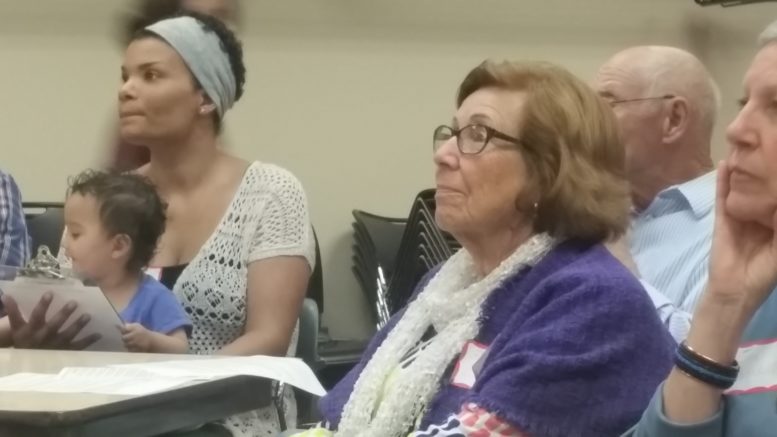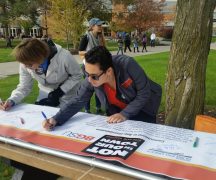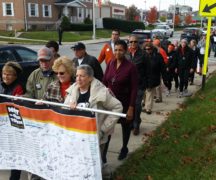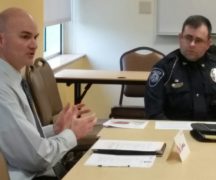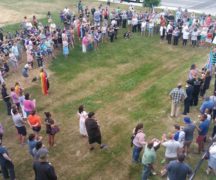By JAN LARSON McLAUGHLIN
BG Independent News
Microaggressions are like mosquito bites. One is an annoyance. But a constant swarm leaves a person feeling angry or helpless.
Microaggressions are the subtle verbal and nonverbal slights, insults, indignities and denigrating messages that are inflicted on people of any marginalized group.
It’s when a person of Asian heritage who was born in the U.S. is praised for speaking English so well. It’s when men at a workplace meeting ignore the women trying to offer input. It’s when a white woman clutches her purse when a black man approaches. It’s the flying of a Confederate flag.
Many times the comments or actions come from well-intentioned people who are unaware of their hidden messages.
Social injustice and oppression have occurred since the beginning of time, explained Dr. Krishna Han, assistant director of the BGSU Office of Multicultural Affairs, during a program on microaggressions Thursday evening organized by Not In Our Town Bowling Green.
But through most of history, smaller acts of social justice were not addressed. However, now that society is aware of the impact of microaggressions, the question is “Now what?” Han asked. There is now a sense of responsibility on people to recognize their hurtful words or acts, and to not just stand by when others are wronged.
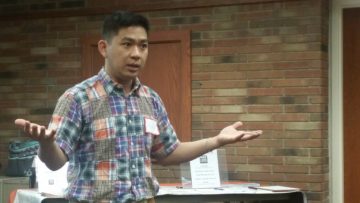
Krishna Han talks about microaggressions
Many of those attending the program last week had experienced microaggressions themselves.
Sheila Brown relayed the story of being told, “Oh my gosh, you’re so articulate,” as if that was shocking for a woman of color.
Rev. Mary Jane Saunders recalled when a parishioner at a previous church praised her sermon, then turned to Saunders’ husband and said, “You wrote that sermon for her, right?”
Allie Dyer said when she is sitting in public areas at Bowling Green State University, some people avoid her. “White people will not sit next to me,” she said.
Some people never have to deal with this. Others only occasionally. But for some, it’s a daily issue.
“If you’re dealing with that on a daily basis, it wears you down,” Han said.
Han talked about the value of self-reflection.
“This is often committed by well-intentioned folks,” he said. Their comments or actions come from ignorance or a lack of exposure.
“We have streams of prejudice that run through our society,” said Rev. Gary Saunders, community co-chair of NIOT.
But some microaggressions are not rooted in innocent ignorance. Some come from phobia, self-righteousness, defensiveness, denial, ego and anger.
Han talked about how even the earliest memories are recorded in our brains. People may not be conscious of it, but comments can be embedded from their parents about people who are gay, of a different race or religion, immigrants, have disabilities, or of a different gender or class.
“Every message we experience” is buried in our brains, he said.
As a child in Cambodia, Han was told that gay men were pedophiles or mentally ill. There is no word in the Cambodian language for “gay.” He was also led to believe that lighter skin was a sign of true beauty. He said all lotions in Cambodia have skin whitening ingredients, and his sister avoided any sunlight before her wedding so her skin would be lighter.
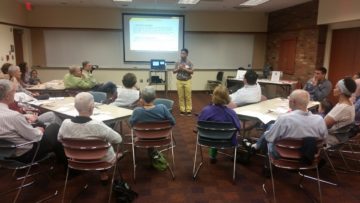
Not In Our Town program on microaggressions
Those messages can take a toll when they become microaggressions toward others. Frequent targets often experience anxiety, paranoia, depression, lack of confidence and feelings of worthlessness, Han said.
So Han addressed how victims and bystanders to microaggressions can respond. He suggested taking a deep breath first to gain composure and make sure you understood what was said. Then, if you feel safe, explain how they made you feel.
There are times when you may need to just let it slide. For example, if a 6-foot 4-inch guy with a Confederate flag in his truck parks next to Han, who is 5-foot 4-inches, it may be best to let it go.
Han said he also has difficulty confronting family members. “Sometimes I just pray my family is being engaged by somebody else,” he said.
Though not easy, it’s important to keep the offending person’s dignity intact. Guilt can act like a glue that holds people in place, Han said.
Sometimes the encounters provide an opportunity to educate someone responsible for hurtful words or actions. But other times, the victim may not be in the right frame of mind to do that.
“They may not want to educate you,” Dyer said. “You get exposed to a lot of injustice and that tends to make you very angry.”
Han agreed. “They have the right to be frustrated.”
Sometimes bystanders can come to the defense of those targeted. Some audience members suggested simple responses of “Whoa” or “Ouch” to make it known that the statements were inappropriate.
Dyer said it can be quite hurtful when bystanders don’t respond. “It’s almost as bad as the person who said something to you,” she said.
The next programs, hosted by Not in Our Town Bowling Green and the BGSU Office of Multicultural Affairs, will be on May 17 and June 1. All programs will be held at the Wood County District Public Library from 6 to 8 p.m. and are free and open to the public.
To learn more about the programs and the topics, go to the Not in Our Town Bowling Green Facebook page (https://www.facebook.com/Not-In-Our-Town-Bowling-Green-411179839042009/). Posts and videos about the program topics will be included on the NIOT BG Facebook page.

